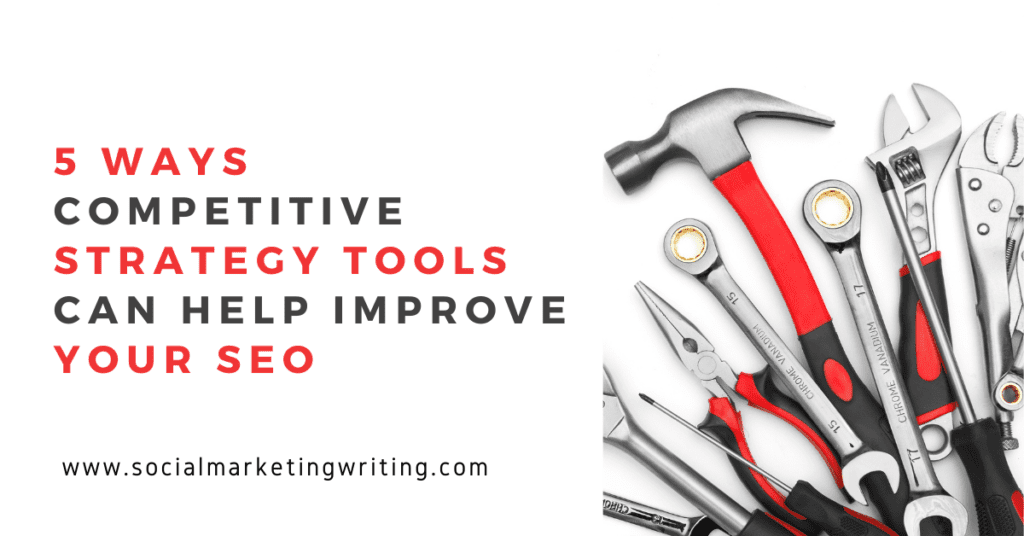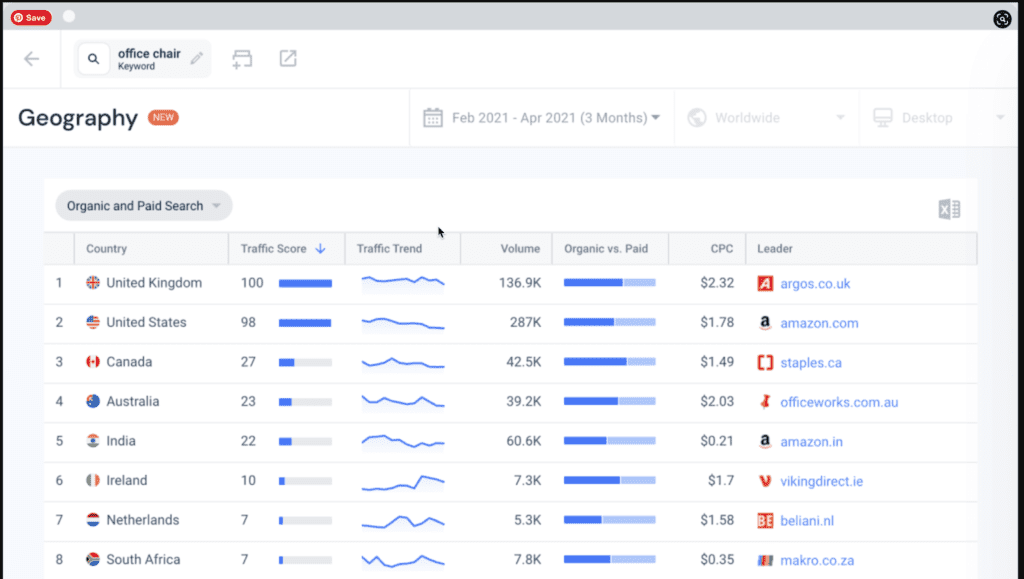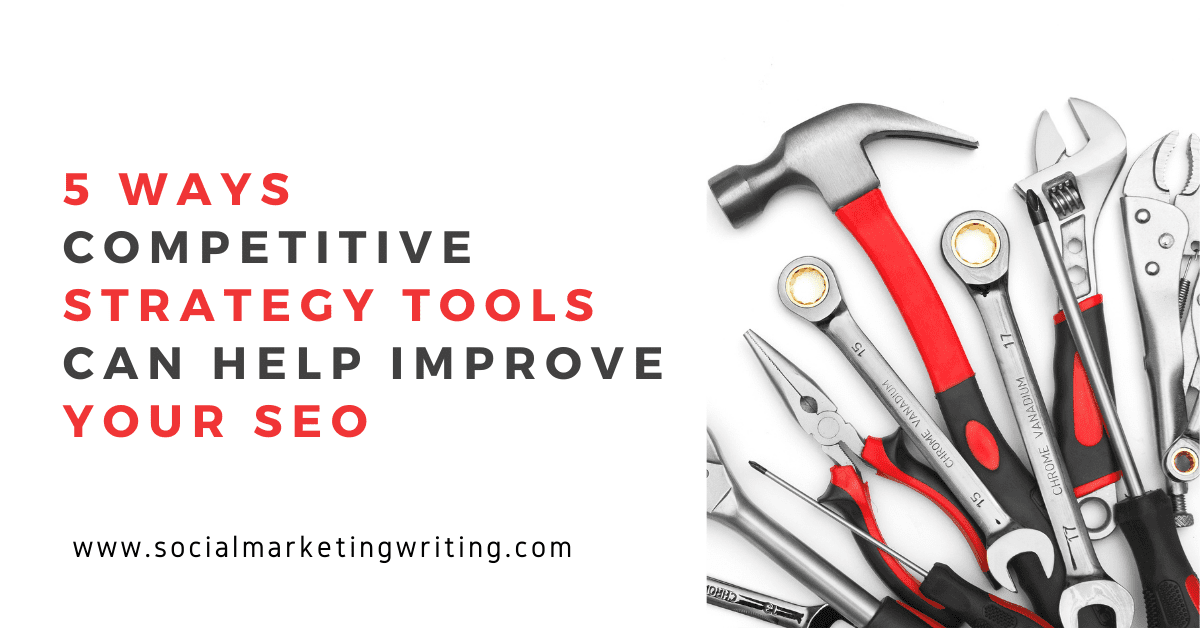5 Ways Competitive Strategy Tools Can Help Improve Your SEO
written by John Hodgkinson | Author Tips and Tricks
April 30, 2023
Analyzing and understanding your competition is one of the best ways to give yourself an edge in today’s digital world. The more you know about your competition, the easier it is to pinpoint ways of outperforming those other companies. When it comes to search traffic, even a tiny advantage over the competition can make all […]
The post 5 Ways Competitive Strategy Tools Can Help Improve Your SEO appeared first on .

Analyzing and understanding your competition is one of the best ways to give yourself an edge in today’s digital world. The more you know about your competition, the easier it is to pinpoint ways of outperforming those other companies.
When it comes to search traffic, even a tiny advantage over the competition can make all the difference. After all, the way the Google algorithm works, for any given user query, the search giant essentially maintains a ranking hierarchy of pages across the web. So to get to the top of the search results for the keywords you’re after, you aren’t only trying to ensure your landing pages rank higher than they used to – you’re trying to ensure that they rank higher than anyone else’s landing pages.
With this in mind, keeping tabs on what others are up to can be a major game-changer.
A strong competitor analysis can also be the key to improving your digital marketing strategy overall. With the right online software, you can determine which keywords you’re missing from your content marketing campaign, or what kind of customer groups you’re not paying enough attention to.
If you’re not using competitive strategy tools to enhance your search engine strategy yet, you could be missing out on powerful opportunities for growth.
Here are just five of the ways the right competitor analysis solution can transform your SEO.
1. Improve Your Keyword Research
While there are a number of factors involved in a successful SEO campaign, few things are more important than leveraging the right keywords and phrases. Unfortunately, many business leaders struggle to come up with ideas for which keywords to target on their own.

Analyzing the competition with an SEO keyword tool is an excellent way to see what kind of terms are driving the most attention to your competitor’s content. This could help you to discover new keywords and long-tail terms you never considered before.
The right rank tracking tool will be able to compare your keyword ranking list against the terms your competitors are ranking for, to show you the most obvious gaps in your strategy immediately. You can then publish better-optimized, more in-depth content with these keywords in mind, gaining an advantage in the rankings.
2. Find Backlinking Opportunities
Outside of keywords, backlinks are another of the major factors determining how successful your search engine strategies are likely to be. The more backlinks you can collect from relevant, authority websites, the more search engines like Google will see your website as a leading resource in your industry. So, where do you start looking for great backlinks?

Checking out your competitor’s top-performing pages with a competitor analysis tool allows you to see what their top traffic referral sources are, what kinds of other companies are linking back to them, and what kinds of pages your competitors are linking out to.
Once you have a list of relevant brands linking to your competitor’s website, all you need to do is give those high-authority companies a better piece of content to link to than your competitor can offer.
3. Discover Which Content Works Best
Increasingly, the search engines like Google and Bing are adjusting their algorithms with a focus on user experience and intent. With that in mind, it’s not enough to just have the most keyword-optimized content on your website. You also need to ensure you’re producing the kind of blogs and articles your customers want to read.
For example, if you work for a travel company, producing data-driven content like this travel study would be a great way to attract your readers’ attention and provide valuable information.
With competitor analysis, you can examine which of your competitors’ pages perform best when it comes to attracting valuable customers from your target audience. Looking at content performance factors like bounce rate and how long customers stay on each page will help you to better understand what your audience is looking for.
This information will give you an excellent opportunity to create the kind of content most likely to convert your customers and keep them coming back to your website. You’ll also be able to use what you learn to reduce the bounce rate of your own website pages, boosting your SEO authority.
4. Learn More About Your Target Audience
While a better understanding of your target audience might not seem critical to SEO at first, it’s actually a significant factor in determining how well you rank. Competitor analysis allows you to gather details about your customers to add to your buyer personas.

These details can include where they come from (geography), what kind of content they’re most likely to engage with, and what kind of content they consume on the path to purchase. With a more in-depth overview of your target audience, you’ll be able to build your SEO and content strategy with a greater focus on reaching the right people.
You can think more carefully about the terms your customers are likely to use based on their age cohort or location, which improves your keyword strategy. You’ll even be able to add certain location-based terms to campaigns if you’re running geographically-targeted marketing efforts.
5. Discover SERP Feature Opportunities
Landing a place in the search engine result page (SERP) feature sections like the featured snippet, or the video section, is a great way to generate more traffic for your website – especially in the age of “zero-click searches.”

When conducting your competitor analysis, you can find out which of your competitors’ pages are already gaining the most attention based on their inclusion of SERP feature optimization.
The deeper you look into your competitors’ campaigns, the more you’ll be able to adjust your own SEO strategy, to use more things like semantic keyword search phrases, bullet points, images, and even star ratings.
Improve Your SEO With Competitor Insights
Sometimes, the easiest way to get ahead of the competition is to learn from them. Analyzing the competitors in your industry carefully can help you to do everything from discovering new keywords, to improving your understanding of your target audience.
The next time you’re wondering what you could do differently in your SEO campaigns, take some inspiration from your competition.

The post 5 Ways Competitive Strategy Tools Can Help Improve Your SEO appeared first on .
